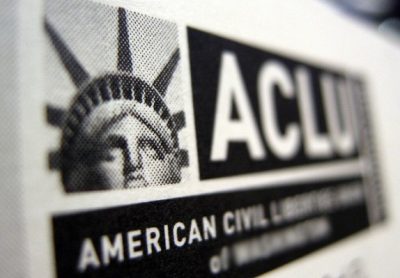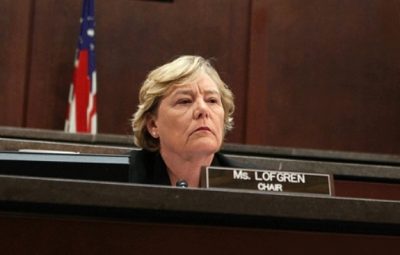Border Enforcement
Migration at the border is a multifaceted issue, challenging the U.S. to secure our borders while upholding the human rights of individuals seeking safety and better opportunities. Balancing national security with compassion and our legal obligations to asylum seekers presents intricate dilemmas, and we collaborate with policymakers to advance bipartisan, action-oriented solutions.
Beyond A Border Solution
- Asylum
- May 3, 2023
America needs durable solutions. These concrete measures can bring orderliness to our border and modernize our overwhelmed asylum system. Read…
Read More
ACLU Files Lawsuit Against Utah’s Immigration Enforcement Law
Today, the American Civil Liberties Union (ACLU), National Immigration Law Center (NILC), and the law firm of Munger, Tolles & Olsen filed a class action lawsuit against Utah’s HB 497— an SB1070-inspired immigration-enforcement bill. Last March, Utah passed three distinct immigration bills that collectively were designed to go beyond the enforcement-only approach of Arizona’s SB1070 through the addition of state-based guest worker programs. Those programs, however, do not go into effect until a host of other conditions are met, leaving the enforcement provisions of HB 497 as the only part of the Utah plan with any teeth. Set to go into effect on May 10, HB 497 presents many of the same Constitutional challenges as SB 1070, thus making a court challenge inevitable. Read More

President Obama Continues To Walk Immigration Tightrope
President Obama delivered a heartfelt commencement address this weekend at Miami-Dade College that once again showed the difficult tightrope he walks on immigration. On the one hand, he reminded his listeners yet again how important immigration reform, including passage of the DREAM Act, is to the continued moral and economic vitality of the country. On the other hand, he said, yet again, that he can’t change the system on his own: Read More

Help Wanted: Latino Leaders and Presidential Leadership Needed on Immigration Reform
President Obama has convened a number of meetings on the issue of immigration lately. However, the one that got the most attention took place this week and included a notable group of Latino actors, journalists and radio personalities for what Politico called “Obama’s Celebrity Roundtable.” Read More

DHS Removes Countries from Special Registration List, But Leaves Door Open for Future Placements
This week, the Department of Homeland Security (DHS) announced that it will remove all countries from the National Security Entry-Exit Registration System (NSEERS). Previously, nonimmigrant travelers from Afghanistan, Algeria, Bahrain, Bangladesh, Egypt, Eritrea, Indonesia, Iran, Iraq, Jordan, Kuwait, Lebanon, Libya, Morocco, North Korea, Oman, Pakistan, Qatar, Saudi Arabia, Somalia, Sudan, Syria, Tunisia, United Arab Emirates, and Yemen were forced to comply with special registration requirements, including providing fingerprints, a photograph, and any additional information required by DHS to DHS officials at the time the nonimmigrant applies for admission at a U.S. port of entry. Read More

New Report Underscores Economic Folly of S.B. 1070-Type Laws in California
Fans of Arizona’s SB 1070 and its many imitators fail to mention one critical feature of their beloved legislation: its economic destructiveness. A dramatic example of just how destructive an SB 1070 clone could be is detailed in a new report from the Center for American Progress (CAP) and the Immigration Policy Center (IPC). The report, entitled Revitalizing the Golden State: What Legalization Over Deportation Could Mean to California and Los Angeles County, spells out the economic losses that would result from the removal of all unauthorized immigrants from California as a whole and Los Angeles County in particular. The report then compares this to the economic gains which would flow from legalizing the unauthorized population. CAP and the IPC released a similar report about Arizona last month. Read More

Are SSA No-Match Letters Putting American Jobs at Risk?
BY TYLER MORAN, NATIONAL IMMIGRATION LAW CENTER The Social Security Administration (SSA) just announced it will resume its practice of notifying employers of discrepancies in employee paperwork through “no-match letters”—a mechanism which threatens countless American jobs. Despite the Administration’s clear assertion that the letter “makes no statement” about a worker’s immigration status, employer confusion over the letters has led to erroneous firings and lost wages in the past, and threatens to be the case now. It is anticipated that over 1 million workers will be the subject of these letters. Read More

Q&A Guide to Arizona’s Immigration Law
One year after the passage of Arizona’s tough new immigration law (SB1070), both opponents and proponents are attempting to assess the impact the new law may have on residents of Arizona—citizens and immigrants alike. A federal district court ruling preliminarily enjoined large parts of the controversial law, meaning that those portions of the new law cannot be implemented, and the Ninth Circuit Court of Appeals upheld the preliminary injunction. Other lawsuits have been filed challenging the constitutionality of the law and have yet to be ruled on, opponents have mounted boycotts, and numerous polls show that a majority of the public both supports the Arizona law and comprehensive immigration reform. Furthermore, despite criticism of SB1070 from Republicans, Democrats, police officials, religious leaders, and civil-rights leaders, legislators in many states have introduced or are considering introducing similar legislation. Read More

Congresswoman Zoe Lofgren Demands Investigation into ICE’s Secure Communities Program
Some would argue that ICE’s Secure Communities program has been fraught with problems ever since it launched in 2008—from concerns over the lack of federal oversight to questions regarding the criminality of immigrants targeted. But after months of back and forth over how and whether jurisdictions are able to opt-out of this immigration enforcement program (which shares the fingerprints of individuals booked into jails with federal databases), California Congresswoman Zoe Lofgren (D-CA) has had enough. This week, Rep. Lofgren called for an investigation into the actions of federal immigration officials whom she said lied about whether states and localities had the right to opt-out of the program. Read More

One Year After SB 1070, States Are Still Grappling with Cost of Immigration Measures
One year ago this month, Arizona Gov. Jan Brewer put her star on the political map when she signed SB 1070, a controversial immigration law which required state and local law-enforcement officials to inquire about immigration status during any lawful stop, detention, or arrest. Some states learned from Arizona—the numerous protests, Supreme Court challenge, costly litigation, economic boycotts that are still costing state businesses millions—and rejected similar laws. Other states, however, are still pushing for immigration enforcement measures despite the continued outcry from businesses and local groups about how these bills will hurt their state. Read More

Get Out Your Wallets, Georgians! State Lawmakers Pass Costly Immigration Measure
Despite the Ninth Circuit Court of Appeals ruling to uphold a preliminary injunction against provisions of Arizona’s SB 1070 earlier this week, state lawmakers in Georgia passed their own version of Arizona’s law (HB 87) last night, which allows police to investigate the immigration status of certain suspects and requires businesses to verify work eligibility of new hires, but not without controversy. Like other states, Georgia lawmakers mulled provisions of their enforcement-only immigration bills—provisions Georgia’s business community fears will hurt the state’s farming and restaurant industries and advocacy groups fear will lead to racial profiling. Some groups are even planning an economic boycott of Georgia—a boycott similar to Arizona’s which is still costing the state. Read More
Make a contribution
Make a direct impact on the lives of immigrants.

